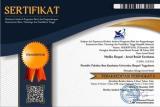HUBUNGAN KADAR GLUKOSA DARAH DAN KADAR HbA1c DENGAN STATUS FUNGSI KOGNITIF PASIEN DIABETES MELLITUS TIPE 2 DI RUMAH SAKIT MARINIR CILANDAK TAHUN 2019
DOI:
https://doi.org/10.35842/mr.v16i1.396Keywords:
Diabetes Mellitus, HbA1c, Cognitive FunctionAbstract
Relationship between Blood Glucose Levels and Hba1c Levels with Cognitive Function Status of Type 2 Diabetes Mellitus Patients at the Cilandak Marine Hospital in 2019
Background: Hyperglycemic and insulin resistance can lead to chronic complications in type 2 diabetes patients with long treatment such as macro vascular, micro vascular and neuropathic complication. This may cause alteration and disruption in various system, included the center of nerve system, that related to cognitive function. Objective: This research aimed to analyze the correlation between cognitive status with blood glucose levels and HbA1c level in type 2 diabetes mellitus patients at Marinir Cilandak Hospital. Methods: This research was an analytic observational research with the approach of Cross Sectional method. The study sample included populations with the inclusion and exclusion criteria of 40 respondents. Samples in this study was calculated using Consecutive Sampling. Results: The results showed multivariate analysis that the entire of the independent variables with cognitive status obtained p value = <0,001 (p <0,05). Conclusion: There was significant correlation between blood glucose levels and HbA1c levels with cognitive status in type 2 diabetes mellitus patients.Â
References
Folstein, M. F., Folstein, S. E., & McHugh, P. R. (1975). “Mini-mental stateâ€. A practical method for grading the cognitive state of patients for the clinician. Journal of Psychiatric Research, 12(3), 189–198. https://doi.org/10.1016/0022-3956(75)90026-6
Kementerian Kesehatan RI Badan Penelitian dan Pengembangan. (2018). Hasil Utama Riset Kesehatan Dasar. Kementrian Kesehatan Republik Indonesia.
Kim, H.-G. (2019). Cognitive dysfunctions in individuals with diabetes mellitus. Yeungnam University Journal of Medicine, 36(3), 183–191. https://doi.org/10.12701/yujm.2019.00255
Kumar Pasupulati, A., Chitra, P. S., & Reddy, G. B. (2016). Advanced glycation end products mediated cellular and molecular events in the pathology of diabetic nephropathy. Biomolecular Concepts, 7(5–6), 293–299. https://doi.org/10.1515/bmc-2016-0021
Kusumaningrum, I. D., & Khoirunisa, iffa. (2013). Hubungan Tingkat Pendidikan Dengan Kepatuhan Minum Obat Pasien Diabetes Melitus Tipe 2 Pada Dokter Keluarga. Jurnal Farmasetis, 2(1), 13–18. https://doi.org/10.32583/farmasetis.v2i1.175
Maghfirah, S. R. (2016). Regulasi Diri Otonom Dan Terkontrol Pada Pasien Diabetes Mellitus Tipe 2. The Indonesian Journal of Health Science, 7(1), 77–85.
Manley, S. E., Hikin, L. J., Round, R. A., Manning, P. W., Luzio, S. D., Dunseath, G. J., Nightingale, P. G., Stratton, I. M., Cramb, R., Sikaris, K. A., Gough, S. C. L., & Webber, J. (2014). Comparison of IFCC-calibrated HbA1c from laboratory and point of care testing systems. Diabetes Research and Clinical Practice, 105(3), 364–372. https://doi.org/10.1016/j.diabres.2014.05.003
Marpaung, J. L. R. (2009). Karakteristik Penderita Diabetes Mellitus Rawat Inap Di Rumah Sakit Umum Pematang Siantar Tahun 2003-2004. Repositori Institusi Universitas Sumatera Utara.
Meloh, M. L., Pandelaki, K., & Sugeng, C. (2015). Hubungan Kadar Gula Darah Tidak Terkontrol Dan Lama Menderita Diabetes Melitus Denganfungsi Kognitif Pada Subyek Diabetes Melitus Tipe 2. E-CliniC, 3(1). https://doi.org/10.35790/ecl.3.1.2015.6837
Notoatmodjo. (2018). Metodologi Penelitian Kesehatan. Jakarta: Rineka Cipta. In Notoatmodjo, S. (2018). Metodologi Penelitian Kesehatan. Jakarta: Rineka Cipta.
Pinchevsky, Y., Butkow, N., Raal, F. J., Chirwa, T., & Rothberg, A. (2020). Demographic and clinical factors associated with development of type 2 diabetes: A review of the literature. International Journal of General Medicine, 13, 121–129. https://doi.org/10.2147/IJGM.S226010
Rawlings, A. M., Sharrett, A. R., Mosley, T. H., Ballew, S. H., Deal, J. A., & Selvin, E. (2017). Glucose peaks and the risk of dementia and 20-year cognitive decline. Diabetes Care, 40(7), 879–886. https://doi.org/10.2337/dc16-2203
Rhee, S. Y., & Kim, Y. S. (2018). The role of advanced glycation end products in diabetic vascular complications. Diabetes and Metabolism Journal, 42(3), 188–195. https://doi.org/10.4093/dmj.2017.0105
rská, D. J., Hill, M., Kvapil, M., Piťhová, P., & Brož, J. (2018). Analysis of Postprandial Glycemia in Relation to Metabolic Compensation and Other Observed Parameters of Outpatients with Type 2 Diabetes Mellitus in the Czech Republic. Diabetes Therapy, 9(2), 665–672. https://doi.org/10.1007/s13300-018-0379-3
Soelistijo, S. A., Novida, H., Rudijanto, A., Soewondo, P., Suastika, K., Manaf, A., Sanusi, H., Lindarto, D., Shahab, A., Pramono, B., Langi, Y. A., Purnamasari, D., Soetedjo, N. N., Saraswati, M. R., Dwipayana, M. P., Yuwono, A., Sasiarini, L., Sugiarto, Sucipto, K. W., & Zufry, H. (2015). Konsensus Pengendalian dan Pencegahan Diabetes Melitus Tipe 2 di Indonesia 2015. Perkeni. https://doi.org/10.1017/CBO9781107415324.004
Tifratene, K., Sakarovitch, C., Rouis, A., Pradier, C., & Robert, P. (2014). Mild cognitive impairment and anti-Alzheimer disease medications: A cross sectional study of the French National Alzheimer Databank (BNA). Journal of Alzheimer’s Disease, 38(3), 541–549. https://doi.org/10.3233/JAD-131103
Tsalissavrina, I., Tritisari, K. P., Handayani, D., Kusumastuty, I., & Ariestiningsih, A. D. (2018). Hubungan lama terdiagnosa diabetes dan kadar glukosa darah dengan fungsi kognitif penderita diabetes tipe 2 di Jawa Timur. AcTion: Aceh Nutrition Journal, 3(1), 28. https://doi.org/10.30867/action.v3i1.96
Waluyan, E. N., Sekeon, S. A. ., & Kawatu, P. A. . (2016). Hubungan Durasi Diabetes Mellitus Tipe 2 Dengan Gangguan Fungsi Kognitif Pada Penderita Diabetes Mellitus Tipe 2 Di Rumah Sakit Bhayangkara Tk. III Manado. Ikmas, 1(3), 1–7. Available in: http://ejournalhealth.com/index.php/ikmas/article/view/82
Widie Nugroho, B. A., Oka Adnyana, I. M., & Purwa Samatra, D. P. G. (2016). Gula darah tidak terkontrol sebagai faktor risiko gangguan fungsi kognitif pada penderita diabetes melitus tipe 2 usia dewasa menengah. Medicina, 47(1). https://doi.org/10.15562/medicina.v47i1.71
World Health Organization. (2010). Global status report on noncommunicable diseases. World Health Organization. https://doi.org/10.1017/CBO9781107415324.004
Yerrapragada, D. B., Rao, C. R., Karunakaran, K., & Lee, H. S. E. (2019). Cognitive dysfunction among adults with type 2 diabetes mellitus in Karnataka, India. Ochsner Journal, 19(3), 227–234. https://doi.org/10.31486/toj.18.0160
Yudia, N., Syafrita, Y., & Machmud, R. (2017). Perbedaan Fungsi Kognitif Antara Pasien Diabetes Melitus Tipe 2 dan Non Diabetes Melitus di RSUP DR M Djamil Padang. Jurnal Kesehatan Andalas, 6(2), 311. https://doi.org/10.25077/jka.v6i2.697
Zhang, L., Yang, J., Liao, Z., Zhao, X., Hu, X., Zhu, W., & Zhang, Z. (2019). Association between diabetes and cognitive function among people over 45 years old in china: A cross-sectional study. International Journal of Environmental Research and Public Health, 16(7). https://doi.org/10.3390/ijerph16071294
Zidny, S. N. (2010). Hubungan Kadar Glukosa Darah dengan Skor Mini Mental State Examination (MMSE) pada Pasien Diabetes Melitus Tipe 2. Universitas Sebelas Maret. https://digilib.uns.ac.id/dokumen/download/18035/NDQ4MjM=/Hubungan-Kadar-Glukosa-Darah-dengan-Skor-Mini-Mental-State-Examination-Mmse-pada-Penderita-Diabetes-Melitus-Tipe-2-SABRINA-NUR-ZIDNY.pdf




